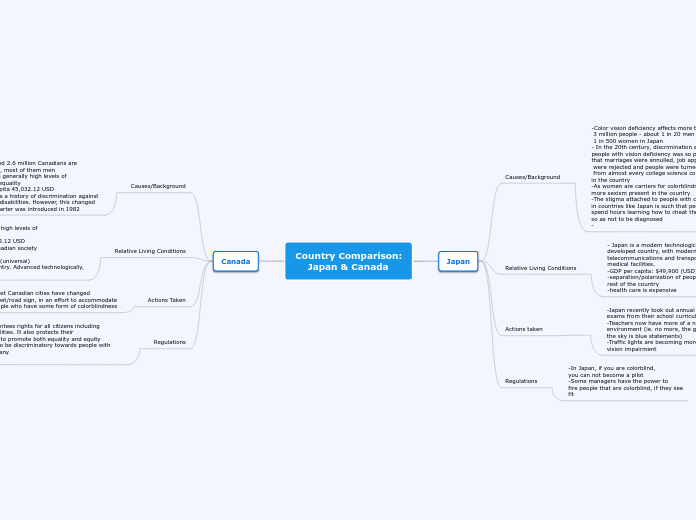Country Comparison:
Japan & Canada
Canada
-The charter guarantees rights for all citizens including
people with disabilities. It also protects their
rights in an effort to promote both equality and equity
-Unconstitutional to be discriminatory towards people with colorblindness, or any
disability in all
Actions Taken
-Most Canadian cities have changed
street/road sign, in an effort to accommodate
people who have some form of colorblindness
-Canada has generally high levels of
economic inequality
-GDP per capita 45,032.12 USD
- A majority of the Canadian society
are accepting
-affordable healthcare (universal)
-Is a very modern country. Advanced technologically,
and socially
-An estimated 2.6 million Canadians are
colour blind, most of them men
-Canada has generally high levels of
economic inequality
-GDP per capita 45,032.12 USD
- Canada has a history of discrimination against
people with disabilities. However, this changed
when the charter was introduced in 1982
Japan
Regulations
-In Japan, if you are colorblind,
you can not become a pilot
-Some managers have the power to
fire people that are colorblind, if they see
fit
Actions taken
-Japan recently took out annual eye
exams from their school curriculum
-Teachers now have more of a neutral learning
environment (ie. no more, the grass is green,
the sky is blue statements)
-Traffic lights are becoming more sensitive to people with vision impairment
Relative Living Conditions
- Japan is a modern technologically advanced first world developed country, with modern infrastructure, telecommunications and transportation systems and modern medical facilities.
-GDP per capita: $49,900 (USD)
-separation/polarization of people with disabilities from the rest of the country
-health care is expensive
Causes/Background
-Color vision deficiency affects more than
3 million people - about 1 in 20 men and
1 in 500 women in Japan
- In the 20th century, discrimination against
people with vision deficiency was so prominent
that marriages were annulled, job applications
were rejected and people were turned away
from almost every college science course
in the country
-As women are carriers for colorblindness there is
more sexism present in the country
-The stigma attached to people with colorblindness
in countries like Japan is such that people
spend hours learning how to cheat the tests,
so as not to be diagnosed
-

